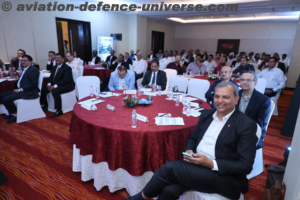Farnborough. 20 August 2022. The Defense Advanced Research Projects Agency (DARPA) has awarded BAE Systems’ FAST Labs™ research and development organization a $17.5 million contract for the Generating RF with Photonic Oscillators for Low Noise (GRYPHON) program. The breakthrough technology developed through the program could enable an unprecedented combination of low noise, compact size, and frequency agility for next-generation airborne sensing and communications capabilities.
Electronic oscillators are the vital technology driving virtually all microelectronic systems. Currently, high performance requires large, power-hungry systems – the size of a mini-fridge. BAE Systems’ approach will maintain or improve performance while reducing the system to the size of a quarter.
BAE Systems’ innovative solution combines the efficiency and agility of digital electronics, and the bandwidth and stability of photonics to deliver precision microwave sources in an unprecedentedly small form factor. This drastically improves size, weight, power, and cost, and allows this next-generation, mission critical technology to be deployed on smaller platforms, and creates a new category of systems.
“New science, thinking, and techniques allow breakthrough technology advances,” said Chris Rappa, chief technologist at BAE Systems’ FAST Labs. “The GRYPHON program is a great example of applying new concepts, such as incorporating photonics and digital electronics, to provide leap-forward innovation.”
Work on the program, which is part of BAE Systems’ advanced electronics portfolio, includes collaboration with subcontractor GenXComm. GenXComm is helping lead the photonics subsystem development for BAE Systems’ work on the GRYPHON program and specializes in the development of advanced microphotonics for RF signal processing to enable high throughput, ultra low latency, interference free wireless mesh networks. GenXComm was introduced to FAST Labs through the Technology Scouting arm of the organization. This group spearheads the company’s goal to collaborate with start-ups, universities, and others in the innovation ecosystem, to leverage new technologies that have both commercial and defense applications and to rapidly deliver discriminating solutions.

































































































































